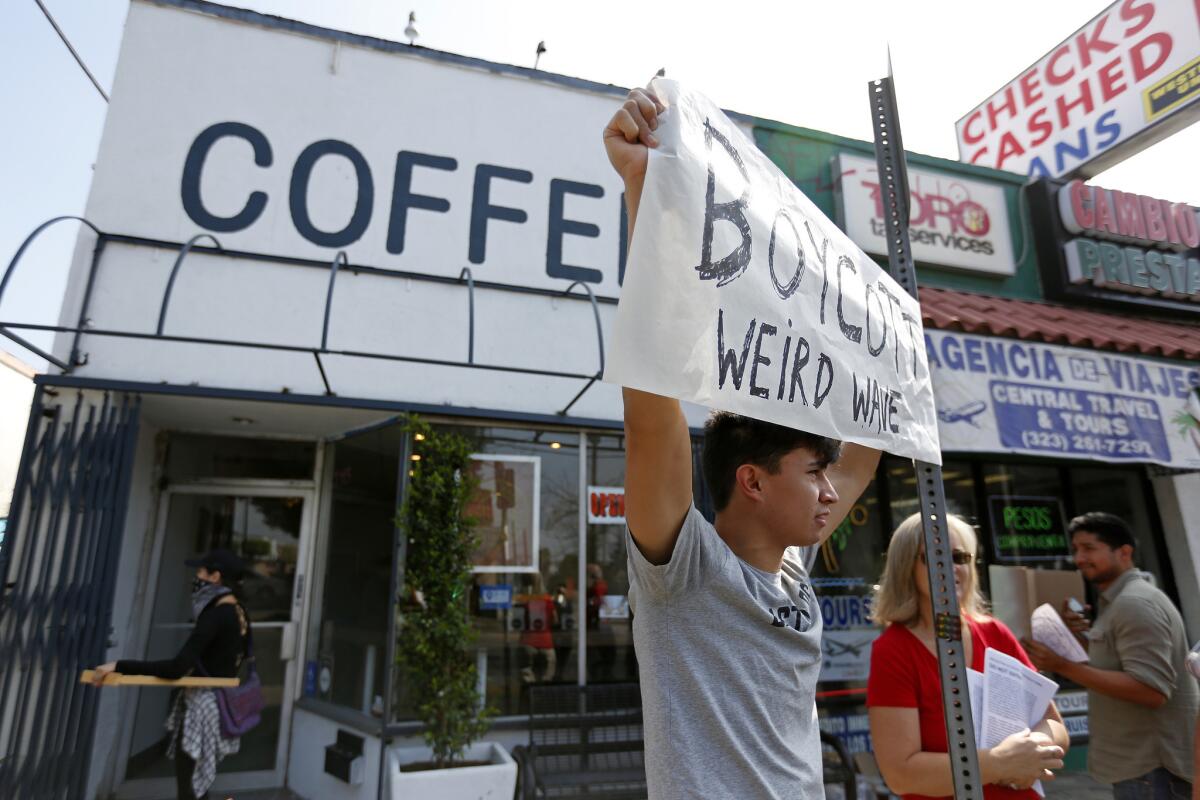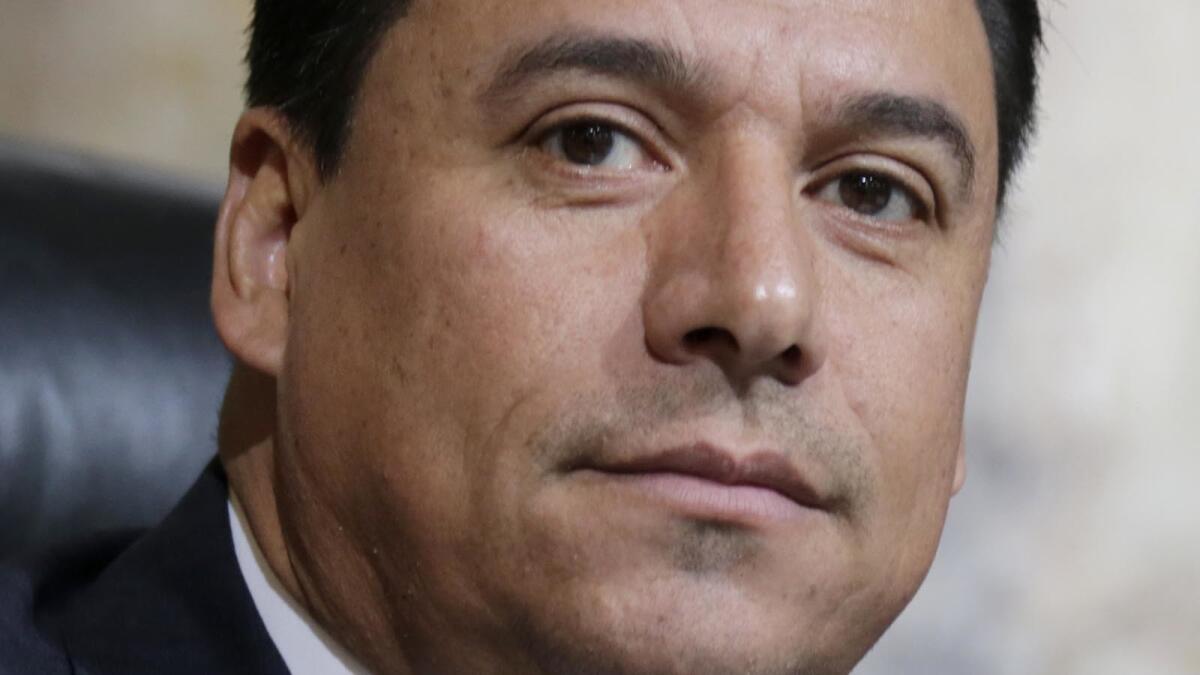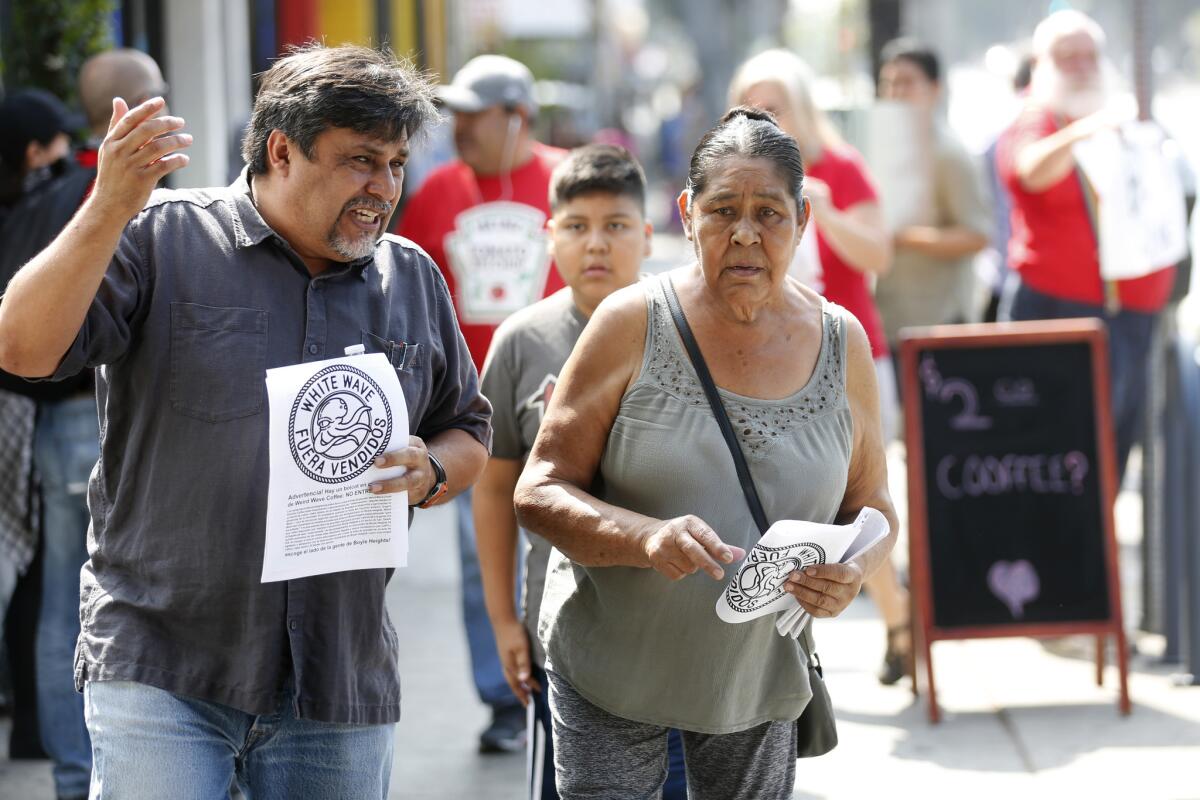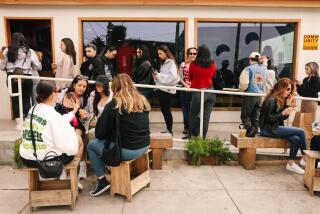Race-based attacks on Boyle Heights businesses prompt this L.A. councilman to take sides

- Share via
Los Angeles City Councilman Jose Huizar spoke out Friday against the vandalism and race-based tactics being used against art galleries and a coffee shop in Boyle Heights amid gentrification concerns, saying the actions were “unacceptable” and would not be tolerated.
Huizar said he shared concerns about displacement and rising costs of housing in Boyle Heights, which activists say has been occurring because of gentrification in the heavily Latino Eastside neighborhood. But he said he but did not like the tactics some activists have been using to voice those concerns.
Huizar’s statement comes after Weird Wave Coffee was vandalized a second time. The coffee shop has been at the center of multiple anti-gentrification protests, similar to the ones held against art galleries in the neighborhood.
“We all have the right to express our 1st Amendment-protected opinions — that is not in dispute,” Huizar wrote in a statement released Friday afternoon. “But when that turns into destroying property or violence of any kind, or targeting people solely based on race, that goes against everything Boyle Heights stands for.”

“Boyle Heights’ history as a diverse community has taught us valuable lessons: Violence is never the answer, and racism begets racism. We must reject it today, tomorrow and always,” he added.
The Los Angeles Police Department is looking into both acts of vandalism.
Anti-gentrification groups — Defend Boyle Heights, Union de Vecinos and the Boyle Heights Alliance Against Artwashing and Displacement — have long been fighting businesses in the neighborhood that they believe will draw new ventures, increase rents and push out local business owners and working families.
As part of that battle, they have relentlessly targeted art galleries that began cropping up in the neighborhood’s industrial region over the last three years.
Early on in the battle against the galleries, protesters stormed into shows and threw detergent on patrons as well as the food they were being served, according to witnesses and news reports. The LAPD investigated the vandalism of one gallery that included graffiti with an expletive directed toward “white art.”

When the owners of Weird Wave Coffee opened their shop last month, they were aware of the movement against gentrification. But they did not think they would be targeted like the art galleries. They were selling coffee, not pricey paintings.
Activists, however, spent weeks trolling the coffeehouse on Instagram before and after it opened. They held protest rallies outside, holding posters — including one with an expletive directed toward “white coffee” and another that read, “AmeriKKKano to go.” They passed out fliers with a parody logo that read “White Wave.”
Some Latino residents who defended Weird Wave Coffee said they were called “coconuts” by activists: Brown on the outside, white on the inside.
The Eastside has long been a center of Los Angeles’ protest movements, whether it was residents marching against the Vietnam War in the 1970s or more recently demonstrating for immigrant rights.
In his statement to the community, Huizar reminded residents that in its early years, Boyle Heights was one of the city’s first diverse communities by, in part, “rejecting racist covenants prevalent in other Los Angeles neighborhoods that literally outlawed people from different ethnic and religious backgrounds from living together.”
“Instead of targeting business owners, particularly small business owners, we should instead focus our attention on tangible solutions to address the gentrification issues we face in Boyle Heights, and indeed throughout the entire city,” said Huizar, whose district includes the Eastside.
“There are real concerns about housing affordability in Boyle Heights and the city of Los Angeles. Even though more of the housing in Boyle Heights has protections under rent control than in other parts of the city, too many of our neighbors are still getting displaced due to rising rents and a shortage of affordable housing.”
Huizar said he is working with community organizations on several housing initiatives, including a door-to-door campaign to inform the more than 88% of renters in Boyle Heights who live in rent-controlled properties that they are protected from illegal rent increases and evictions.
“These are just a few things we can do together. Whether we’re expressing our free speech or working to create better policy, let’s not lose sight of who we are and what Boyle Heights is all about,” Huizar said. “Our history offers us another valuable lesson: When Boyle Heights works together toward one goal, we can do anything.”
For more Southern California news, follow @latvives on Twitter.
ALSO
A community in flux: Will Boyle Heights be ruined by one coffee shop?
Vandal targets coffee shop at center of anti-gentrification protests in Boyle Heights
Customers, neighbors step up support for Boyle Heights coffee shop hit again by vandals
More to Read
Sign up for Essential California
The most important California stories and recommendations in your inbox every morning.
You may occasionally receive promotional content from the Los Angeles Times.











